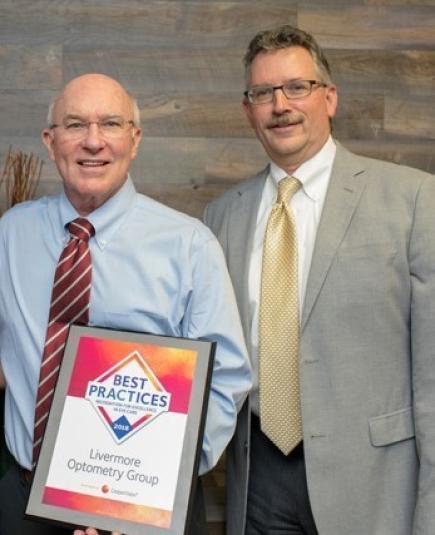
Big. Small. New. Established. CooperVision’s Best Practices are different, but they share a common goal: To deliver exceptional care to patients, even in the face of increasing competition and challenges. Established in 2015, Best Practices recognizes and celebrates the visionary, innovative, and unexpected aspects of care delivery that best serve patients and advance the profession. In this series of articles, CooperVision’s 2018 class of Best Practices honorees will be highlighted, one by one, to uncover and share some unique aspects of their practices that help them thrive—with hope that other practitioners may garner inspiration to bolster their own success. This month, Steven Faith, OD, Clark Abramson, OD, and Shawna Kuntz, OD, of Livermore Optometry Group in the San Francisco Bay area explain the important role that technology plays in their practice, and how “getting out of the way” has been key to their success.
Q: What professional services do you offer at your practice?
A: We offer complete eye care—anything you can think of, short of surgery. This includes contact lenses, pediatric eye care, binocular vision, disease management, low vision, and more. There isn’t a contact lens on the market that we don’t fit, so we are known for contact lens services. And we are one of the only independent offices in the area that offers complete low vision services.
Q: Investing in the latest technology is a priority for your practice. Why is that?
A: We have every piece of useful technology available. Some argue that certain equipment doesn’t make financial sense, but we have ROI, and RMI—return on mental investment. If we have the means to obtain technology to help our doctors do a more thorough job and take better care of patients, we’re going to invest in it.
Q: What is your approach to staffing? How has that evolved over your years in practice?
A: We are always looking and hire people even when we don’t need them. We would rather have the right people and be overstaffed than to ever be understaffed. Over the years, we have learned that as doctors, we are better at seeing patients than we are at managing staff. We have become diligent about finding a management team we can trust to take care of scheduling, accounting, and more. We surround ourselves with wonderful people, provide guidance on the “bigger picture” direction of the practice, and then get out of their way!
Q: What single piece of advice would you give to a practitioner about to open a new practice?
A: The same advice given to us more than 30 years ago: 1) Be likeable, and 2) Control your personal overhead. The rest will fall into place.
Q: When you consider how patients’ needs have evolved over time, how do you plan to modify your practice to meet these new demands?
A: The #1 demand is convenience, so we have modified our systems in response. Our advanced website allows patients to shop for glasses, order contact lenses, and pay their bills. We utilize a communications system for email and text reminders. We are also diminishing magazines in the waiting room—now we have several iPads available for use.
Q: Tell us about Livermore Optometry’s involvement in its community.
A: We have strong ties to our community. We help coordinate a community health fair that benefits children who don’t otherwise have access to healthcare. We have also helped establish a concussion protocol with two of our area high schools so they are properly prepared to handle those injuries.
Q: What does being a Best Practice mean to you?
Our office has been striving to be cutting edge for more than 70 years. This gives us and the staff the extra support and proof that we are doing something right!
Congratulations to Livermore Optometry Group! This year’s honorees will collaborate to tackle the most demanding challenges of contemporary optometric practice. For more information about the program, its honorees (both current and past), and updates about how they are working together to advance the profession, visit eyecarebestpractices.com





